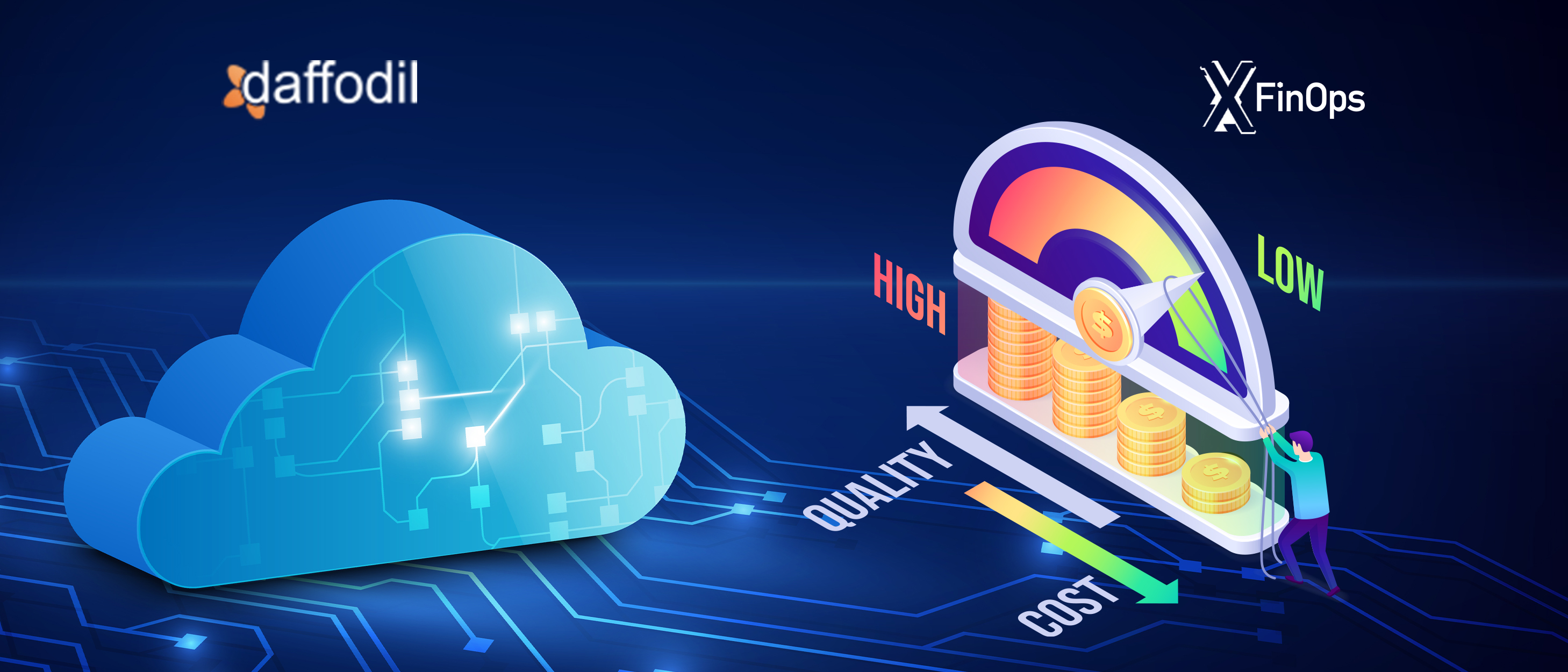
As software development gets complex, we see cross-functional teams collaborating to enable faster product delivery, optimize cost, manage infrastructure, and for several business benefits. An example of such a joint effort is ‘Cloud FinOps’ wherein finance, engineering, technology, and business teams aim at cloud financial management.
Cloud FinOps is a discipline where every individual on the team takes ownership of their cloud usage and spending, supported by best practices for cloud optimization. The FinOps approach enables organizations to derive maximum business value from the cloud and its variable cost models.
|
Cloud FinOps Team |
||||
|
Engineering |
Finance |
Technology |
Business |
FinOps Specialist |
Why FinOps is even needed?
Over one-third of businesses overrun their cloud budget by up to 40%.
Despite having the plan to migrate to the cloud, organizations end up spending more than expected on the cloud. There are 3 key reasons behind it:
Overprovisioning: This is a condition where cloud resources, such as instances, database warehouse, VMs, etc. are stocked up to meet any unforeseen spike in demand. This is to ensure uninterrupted business operations. This results in abandoned, idle resources that aren’t suspended or shut down when unused and thus increase the cloud cost.
Siloed teams: Different teams work on a software development project. If resource procurement is done without discussion between the stakeholders (responsible for managing cost), it will inflate the overall cloud cost.
Variable cloud spending: Organizations purchase cloud infrastructure through public discounts. This cost on the cloud is variable; i.e. it changes every month, day, and minute. The variable cost associated with the cloud is the reason why cloud bills don’t stay within the defined limits.
The cloud FinOps team is responsible to assess the exact reason causing cloud cost overruns and figure out ways to optimize it. But, it’s not easy as it sounds. There are several challenges associated with cloud cost management that needs address to get maximum business value from the cloud.
Key FinOps Challenges in Cloud Financial Management
1) Engineers unaccountable for cloud optimization
Cloud has enabled instant access to resources which often results in overprovisioning of resources in test, staging, and production environments. These resources, when running idle results in an inadvertent cloud cost. That is why it is important for engineers to take accountability for the cost of spending that goes into building a cloud infrastructure.
2) Absence of Cloud Optimization Specialist
Despite different teams taking accountability for controlling the cloud cost, it is necessary that a FinOps expert is aligned to take care of cloud cost optimization. The roles and responsibilities of specialists would include
- Real-time financial reporting & forecasting,
- Choosing a relevant cloud partner
- Comparing several cloud services
- Managing hybrid cloud costs, etc.
Ignoring the role of a FinOps expert in cloud cost optimization would lead to an unplanned roadmap to managing the spending.
3) Unmanaged resources: Idle or underutilized
When it comes to controlling the infrastructure cost, cloud resource optimization is the key workaround. Managing or shutting down idle resources helps to minimize the waste of resources and significantly reduce cloud computing bills. There are several cloud cost assessment tools that can be used to figure out idle or underutilized resources in order to understand the scope of work toward resource optimization.
A free cloud cost assessment to know what’s making your cloud bills overrun. Get a free report generated within 24 hours for actionable measures to cloud cost management.
4) Unpredictable cloud spending
Cloud spending is variable and thus difficult to predict. Forecasting service or product consumption needs data and tools to understand the cost and take steps toward optimization. It is important to consider forecast granularity, accuracy, and frequency to avoid bill shocks.
5) Missing communication b/w the finance and tech team
To keep the cloud cost in control, it is there should be continuous communication between the tech/eng team and finance/procurement team. This ensures that the finance teams help the engineers take relevant and informed divisions that do not increase the overall cost. The benefit of adopting cloud FinOps is it breaks down the barriers between cross-team communication to make mutual decisions around cloud infrastructure management.
6) Container & multi-cloud cost reporting
Containers and container orchestration platforms have a crucial role in software development and it’s crucial to understand the impact of containerized loads on overall cloud cost. With shared resources such as containers, there are challenges of cost visibility, cost allocation, and resource optimization.
Another challenge in cloud cost optimization is the hybrid or multi-cloud strategy. This cloud infrastructure model poses challenges to understanding consumption, invoices, billing analysis, and ultimately cost management.
7) No Track of the shared cost
One of the overlooked areas of cloud cost management is tracking of shared cost. For proper allocation of budgets, it is important to visualize cost, consumption, and ownership of resources so that the stakeholders are able to take informed decisions for managing the overall cloud cost.
FinOps Expert to Optimize Cloud Cost Strategy
To work around cloud cost optimization, the first and key step is to hire a finOps specialist who will align cost assessment and management efforts in the right direction. To know more about cloud infrastructure optimization and how our experts can help you with it, have a look at our comprehensive DevOps services.



